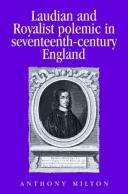| Listing 1 - 2 of 2 |
Sort by
|
Book
ISBN: 1805430181 1783277734 Year: 2023 Publisher: Woodbridge, Suffolk : Boydell Press,
Abstract | Keywords | Export | Availability | Bookmark
 Loading...
Loading...Choose an application
- Reference Manager
- EndNote
- RefWorks (Direct export to RefWorks)
This book investigates a puzzling and neglected phenomenon - the rise of English Arminianism during the decade of puritan rule. Throughout the 1650s, numerous publications, from scholarly folios to popular pamphlets, attacked the doctrinal commitments of Reformed Orthodoxy. This anti-Calvinist onslaught came from different directions: episcopalian royalists (Henry Hammond, Herbert Thorndike, Peter Heylyn), radical puritan defenders of the regicide (John Goodwin and John Milton), and sectarian Quakers and General Baptists. Unprecedented rejection of Calvinist soteriology was often coupled with increased engagement with Catholic, Lutheran and Remonstrant alternatives. As a result, sophisticated Arminian publications emerged on a scale that far exceeded the Laudian era. Cromwellian England therefore witnessed an episode of religious debate that significantly altered the doctrinal consensus of the Church of England for the remainder of the seventeenth century. The book will appeal to historians interested in the contested nature of 'Anglicanism' and theologians interested in Protestant debates regarding sovereignty and free will. Part One is a work of religious history, which charts the rise of English Arminianism across different ecclesial camps - episcopal, puritan and sectarian. These chapters not only introduce the main protagonists but also highlight a surprising range of distinctly English Arminian formulations. Part Two is a work of historical theology, which traces the detailed doctrinal formulations of two prominent divines - the puritan John Goodwin and the episcopalian Henry Hammond. Their Arminian theologies are set in the context of the Western theological tradition and the soteriological debates, that followed the Synod of Dort. The book therefore integrates historical and theological enquiry to offer a new perspective on the crisis of 'Calvinism' in post-Reformation England.
Arminianism --- Calvinism --- History --- Church of England --- Catholic. --- Herbert Thorndike. --- John Milton. --- Lutheran. --- Peter Heylyn. --- Remonstrant. --- Synod of Dort. --- William Laud. --- post-Reformation England. --- soteriology.

ISBN: 1781700818 1847791506 9781847791504 9781781700815 9780719064456 0719064457 9780719064449 0719064449 1847795684 Year: 2007 Publisher: Manchester : Manchester University Press,
Abstract | Keywords | Export | Availability | Bookmark
 Loading...
Loading...Choose an application
- Reference Manager
- EndNote
- RefWorks (Direct export to RefWorks)
This is the first full-length study of one of the most prolific and controversial polemical authors of the seventeenth century. It provides for the first time a detailed analysis of the ways in which Laudian and royalist polemical literature was created, tracing continuities and changes in a single corpus of writings from 1621 through to 1662. In the process, the author presents important new perspectives on the origins and development of Laudianism and 'Anglicanism' and on the tensions within royalist thought.Milton's book is neither a conventional biography nor simply a study of printed work
Religion and literature --- Reformation --- Royalists --- Polemics in literature. --- Reformation in literature. --- Religious disputations --- History --- Heylyn, Peter, --- Influence. --- Colloquies, Religious --- Disputations, Religious --- Disputations, Theological --- Religious colloquies --- Religious debates --- Theological disputations --- Theology --- Debates and debating --- Monarchists --- Monarchy --- Protestant Reformation --- Church history --- Counter-Reformation --- Protestantism --- Disputations --- Heylin, Peter, --- Hall, Robert, --- Learned and impartial hand, --- Churchman, Theophilus, --- Meylyn, --- Officer in his Majesties army, --- Heylin, --- Treleinie, --- Heylyn, Pet., --- Anglicanism. --- English politics. --- Laudianism. --- Peter Heylyn. --- early modern religion. --- polemical author. --- royalism. --- royalist polemical literature. --- royalist thought. --- seventeenth century.
| Listing 1 - 2 of 2 |
Sort by
|

 Search
Search Feedback
Feedback About UniCat
About UniCat  Help
Help News
News